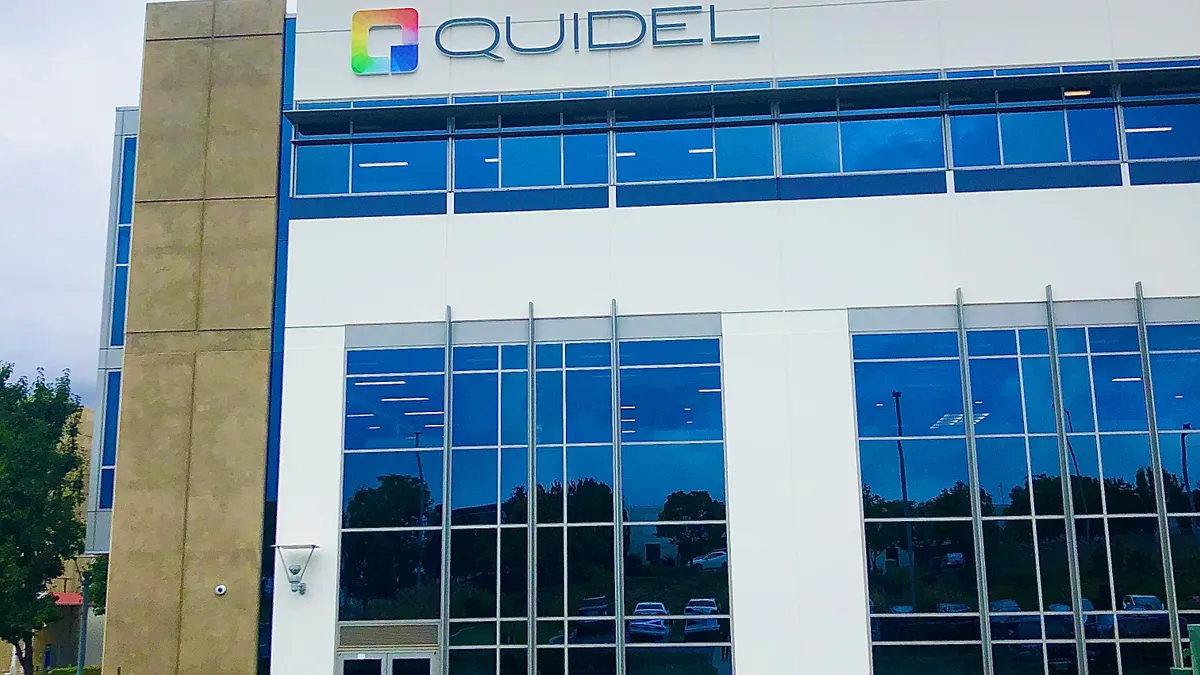Dive Brief:
- Quidel on Thursday reported preliminary first-quarter revenue in the range of $374 million to $376 million, far below Wall Street's expectation of $466 million. Shares fell more than 9% in Friday morning trading.
- While COVID-19 revenues are expected to be over $280 million, versus $1 million during the same period in 2020, CEO Doug Bryant called the test environment "fluid" and demand difficult to predict with certainty. Bryant in part blamed the miss on coronavirus "volatility" and a lack of circulating influenza which caused first-quarter flu revenues to come in at $5 million, compared to $79.6 million a year ago, which was "well below" expectations.
- The disappointing forecast stoked frustration among analysts, who were blindsided. Craig-Hallum's Alex Nowak wrote in a Friday note that Quidel's near-term revenue figures are "unforecastable" and that "it is very difficult to lean on 2021 with any confidence."
Dive Insight:
The pre-announcement is in stark contrast to Quidel's fourth quarter results, which were up 81% sequentially and 432% year on year, driven by COVID-19 antigen tests.
The first signs of trouble appeared last month when the company lowered 2021 guidance from $2.9 billion to roughly $2.5 billion, adjusting for a steep drop in coronavirus test demand in the first quarter.
Bryant delivered the initial bad news at last month's virtual Barclays Global Healthcare Conference, revealing testing demand had plunged between 30% and 40% in February and March compared to the fourth quarter. In particular, Bryant reported that coronavirus testing of symptomatic individuals had fallen sharply. At the time, Bryant estimated first-quarter revenue of at least $450 million.
With the latest forecast, William Blair analysts said they were "surprised to see not just that the company missed its [revenue] floor, but the magnitude by which it occurred." The analysts noted the ongoing uncertainty for the company as the COVID-19 diagnostics market shifts from symptomatic to asymptomatic testing.
While Abbott Laboratories and Becton Dickinson have the ability to "offset slowing demand for symptomatic testing domestically" with international opportunities or U.S. government contracts, Quidel is "levered to U.S. testing dynamics in the professional segment" and has not yet been able to quickly and efficiently adjust its testing capacity, William Blair analysts wrote.
William Blair analysts admitted they "under-called" Quidel's ability to pivot its testing capacity the way other rivals have. Going forward, they said Quidel "will need to bolster its infrastructure and capabilities to service what we think is an important asymptomatic screening market (mainly occurring in nonprofessional settings where Quidel has limited infrastructure at present)."
Bryant acknowledged in a statement Quidel is "early" in the company's "transition to on-site and at-home testing for asymptomatic and pre-symptomatic individuals" and that demand for its QuickVue SARS antigen tests is well above what it can supply until its new plant in Carlsbad, California is up and running.
Quidel did not provide updated full-year 2021 guidance given the "volatility" in the market. However, Craig-Hallum's Nowak said his estimates are well below management's $2.5 billion lowered target laid out by the company last month.
Quidel's stock price has been cut in half since February.
While the William Blair analysts downplayed the effect of Thursday's disappointing announcement on the valuation of the business, calling it "not meaningfully" impacted, they warned about the harm it has done to "sentiment" on Quidel's stock which will "shake investor confidence on the management team's ability to manage through such a dynamic situation."
Quidel on Thursday announced that it signed a new distribution agreement with McKesson to help increase consumer access to the company’s over-the-counter QuickVue COVID-19 home test. The company said it also expects to enter direct partnerships with a number of major national retailers, several state school programs, and a major global employer group.
"While we are very bullish on the alternative market potential (not just for COVID, but the testing market beyond COVID), we doubt investors will give Quidel much credit for these indications until near-term expectations begin to be met," Nowak wrote.
Quidel will provide full financial results for the first quarter on May 6.












